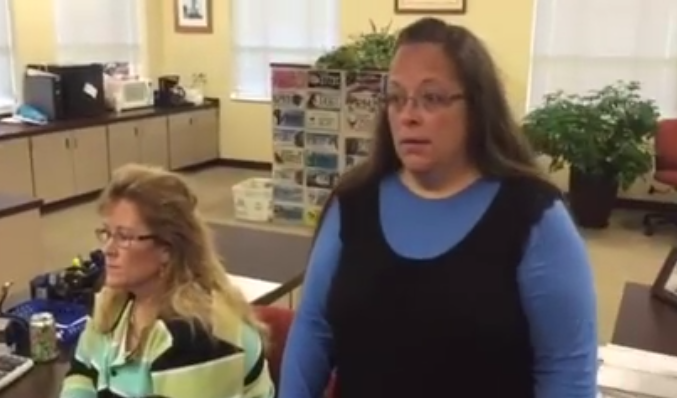 MOREHEAD, Ky. — A county clerk in Kentucky remained defiant of a federal court order to issue marriage licenses to homosexuals a day after the U.S. Supreme Court declined to grant her a stay of the order while her appeal moves forward in court.
MOREHEAD, Ky. — A county clerk in Kentucky remained defiant of a federal court order to issue marriage licenses to homosexuals a day after the U.S. Supreme Court declined to grant her a stay of the order while her appeal moves forward in court.
“I just want you to know that we are not issuing marriage licenses today pending an appeal to the Sixth Circuit,” local television station LEX 18 recorded Rowan County clerk Kim Davis as stating while turning away a homosexual man on Tuesday.
“The Supreme Court denied your stay,” the man contended.
“We are not issuing marriage licenses,” Davis responded.
“Under whose authority?” another man called out.
“Under God’s authority,” Davis said firmly.
As previously reported, Davis has been the subject of a federal suit filed by the American Civil Liberties Union (ACLU) on behalf of two homosexuals and their partners, and well as two opposite-sex couples, after she declined to issue any marriage licenses of any kind following the U.S. Supreme Court ruling in Obergefell v. Hodges.
But Davis also sued Gov. Steve Beshear, a Democrat, after he declared in a letter that all county clerks must issue licenses to homosexuals despite their identity as a Christian.
“Neither your oath nor the Supreme Court dictates what you must believe. But as elected officials, they do prescribe how we must act,” he wrote.
Last month, U.S. District Judge David Bunning ruled in the ACLU case, making similar statements as Beshear—that Davis may have the free exercise of religion in her private life, but limited her Christian identity on the job to a mental belief as opposed to an inseparable, inviolable lifestyle that excludes her from being a facilitator of other men’s sins. (1 Timothy 5:22)
Her attorneys then appealed the order, but the Sixth Circuit Court of Appeals agreed with Bunning denying the desired stay. The U.S. Supreme Court likewise rejected the stay request on Monday.
“The application for stay presented to Justice Kagan and by her referred to the court is denied,” the court wrote on Monday without further comment.
Davis, through her attorneys at Liberty Counsel, issued a statement on Tuesday to explain why it is not possible for her to comply with the order.
“In addition to my desire to serve the people of Rowan County, I owe my life to Jesus Christ who loves me and gave His life for me,” she wrote. “Following the death of my godly mother-in-law over four years ago, I went to church to fulfill her dying wish. There I heard a message of grace and forgiveness and surrendered my life to Jesus Christ.”
“I never imagined a day like this would come, where I would be asked to violate a central teaching of Scripture and of Jesus Himself regarding marriage,” Davis continued. “To issue a marriage license which conflicts with God’s definition of marriage, with my name affixed to the certificate, would violate my conscience.”
She said that she does not hate homosexuals, but cannot herself disobey God by personally facilitating the sins of others and should not be forced to do so.
“It is not a light issue for me. It is a Heaven or Hell decision. For me it is a decision of obedience,” Davis stated. “I have no animosity toward anyone and harbor no ill will. To me this has never been a gay or lesbian issue. It is about marriage and God’s Word. It is a matter of religious liberty, which is protected under the First Amendment, the Kentucky Constitution, and in the Kentucky Religious Freedom Restoration Act.”
As previously reported, Martin Luther King, Jr., in his well-known “Letter from Birmingham Jail,” written in Alabama during a time when segregation was considered the law, said that while some may question disobedience to civil law, a law is not a law if it violates the law of God.
“One may well ask, ‘How can you advocate breaking some laws and obeying others?’ The answer lies in the fact that there are two types of laws: just and unjust,” he explained. “I would be the first to advocate obeying just laws. One has not only a legal but a moral responsibility to obey just laws. Conversely, one has a moral responsibility to disobey unjust laws.”
“How does one determine whether a law is just or unjust? A just law is a man made code that squares with the moral law or the law of God. An unjust law is a code that is out of harmony with the moral law,” King continued. “Of course, there is nothing new about this kind of civil disobedience. It was evidenced sublimely in the refusal of Shadrach, Meshach and Abednego to obey the laws of Nebuchadnezzar, on the ground that a higher moral law was at stake. It was practiced superbly by the early Christians, who were willing to face hungry lions and the excruciating pain of chopping blocks rather than submit to certain unjust laws of the Roman Empire.”
Become a Christian News Network Supporter...


